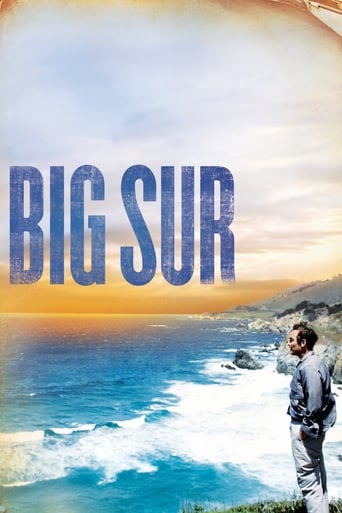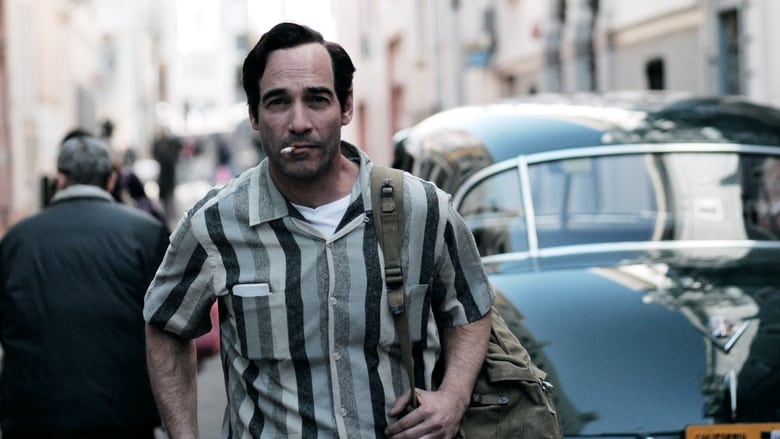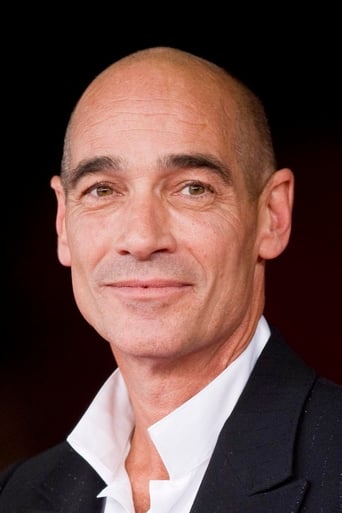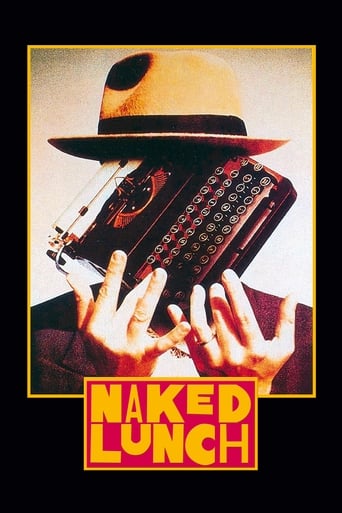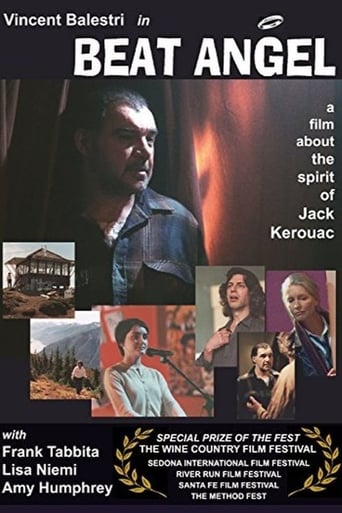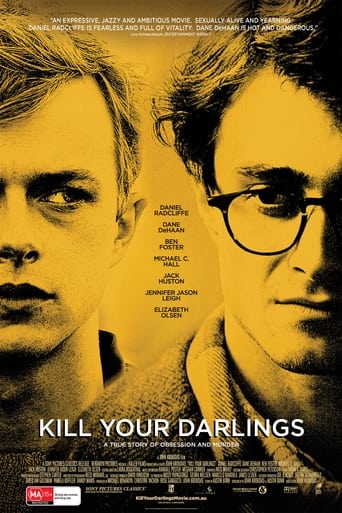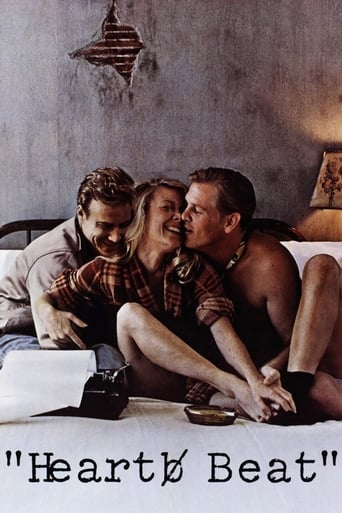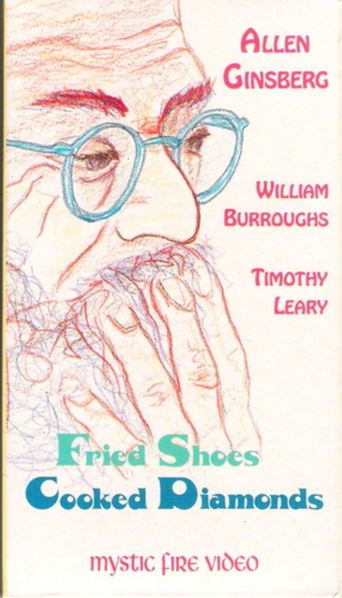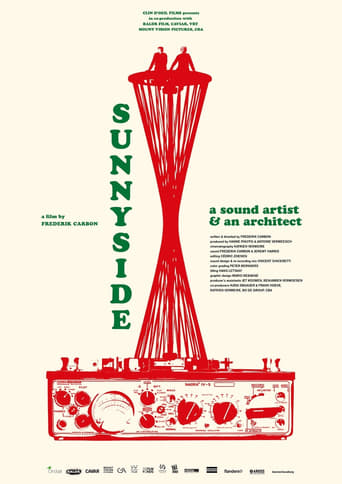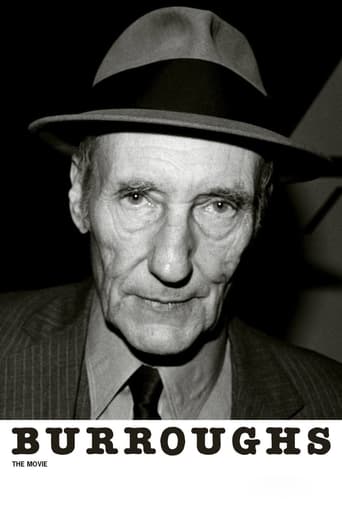Big Sur (2013)
Big Sur is a film adaptation of the Jack Kerouac autobiographical novel of the same name.
Watch Trailer
Free Trial Channels
Cast


Similar titles
Reviews
It's funny watching the elements come together in this complicated scam. On one hand, the set-up isn't quite as complex as it seems, but there's an easy sense of fun in every exchange.
I think this is a new genre that they're all sort of working their way through it and haven't got all the kinks worked out yet but it's a genre that works for me.
All of these films share one commonality, that being a kind of emotional center that humanizes a cast of monsters.
Story: It's very simple but honestly that is fine.
This film is a total drag. I had no idea Kerouac was such a loser. I honestly don't know what he had to complain about. Here he is, a famous writer, in bed with a gorgeous woman, surrounded by friends and the guy is miserable as hell. I have no sympathy for people like that. Plus he never stops drinking. I guess being a writer the booze is just an occupational hazard but still, I've never seen anyone drink that much! I know he died young as a result of alcoholism and that really doesn't surprise me now. Both he and Cassady had such sad endings. Perhaps there is a moral in there somewhere but I don't know what it is. If you want to read a truly inspirational writer, who is often called the father of the beats, check out Henry Miller, who is mentioned in the film once or twice, as another writer who would up in Big Sur. Now Miller knew how to live. He never let depression beat him. The man was a force of nature. Forget about Kerouac and Burroughs, these guys had serious issues. Henry Miller is yr man. Reading his material never fails to lift my spirits. As for the film, watch it for the scenery and a semi-nude Kate Bosworth, that's about all it's good for.
As a longtime fan of Kerouac and reader of many of his works, I'm accustomed to his spontaneous, stream-of- consciousness writing. As such, I enjoyed the manner in which the narration was executed as it represented an accurate portrayal of his style."Big Sur" was written at a point in Jack's life during which his demons were beginning to take hold, replacing the wonder and excitement depicted in his earlier works with dread, self- loathing and ultimate despair. The bottle was no longer a means with which to enhance new experiences, rather, it had become a dark and lonely place in which to hide. This is not a feel- good story.Overall, I felt the film provided an accurate portrayal of Jack at this point in his life and it mostly depicted the various characters as I would have expected, given their descriptions in the book. Neal was a likable wild man who also seemed larger than life and I felt that his persona and magnetic traits were well portrayed. The only issue I had with the film was somewhat superficial and it concerns the modern hairstyles of Billie and Lenora - especially the latter, woodenly played by Stana Katic, who seemed to be a poor casting choice, in general. In fact, the period-incorrect styling choices of these two characters somewhat detracted from the feel of the scenes in which they were involved, which I found to be a rather disappointing oversight on the part of the director. The period style issues aside, this is an enjoyable film for those who are fans of Jack's life and writing style. To the casual viewer, it will likely come across as heavy, meandering and a bit depressing.
This is a brief review of "On the Road" and "Big Sur", two films based on novels by Jack Kerouac. In the years after World War 2, the United States saw the rise of the Beat Generation, a growing group of men and women who rejected the trends, wants, values and aspirations of the post war majority. The Beats sought spiritual meaning, rejected America's docility in the face of consumer capitalism, and were branded by many as "radicals", "dissidents" and "bums". Older generations, especially those who had struggled during the Depression, were thoroughly confused by this movement. Why did they reject work? What was wrong with them? Why did they challenge the sexual, religious and political conventions of the day? Some historians disagree about the size, influence and importance of the Beat movement, but most trace its beginnings back to 1944, when Allen Ginsberg met Jack Kerouac at Columbia University. Ginsberg would be suspended from school and Kerouac would drop out. Both would befriend the infamous William Burroughs, who at the time lived in Greenwich Village. The trio would bond with other outcasts, and spent the 1940s exploring the Village, writing poetry, novels, listening to jazz, experimenting with drugs, having uninhibited sex and waxing philosophical. Most had no steady employment. Some drifted toward Buddhism. In 1957, Norman Mailer would dub the Beats "the White Negroes". In his articles he would draw parallels between African-American and Beat lifestyles, both deemed alienated, both deemed to have deviant tastes in literature, music, language and religion. Historian Douglas T. Miller would say "the Beats made the establishment afraid because they were a genuine bunch of dissenters; they were humanitarian, attractively hedonistic, very vaguely left-wing, and most of all, popular. That gave them a dangerous power". Historian Allen Matusow would describe the Beats as "the forerunners of the Hippie Movement". Unsurprisingly, the Beats came under scrutiny of the FBI, which used McCarthyist tactics to squash what they deemed a "subversive group". At a 1960 Republican Convention, J. Edgar Hoover named "beatniks" one of the three menaces to the United States, the other two being "communism" and "intellectuals", which pretty much sums up US policy; keep em' stupid and consuming. Kerouac would publish "On the Road" in 1957. It would be turned into a 2012 film by Walter Salles. Both works find a gang of young adults on a trip across America. Their unspoken mission? To find a new, more "free" mode of living which exists thoroughly outside of contemporary conventions. More importantly, they seek to find a new way of measuring happiness and success. As such, our gang reject traditional nuclear families and form a kind of polygamous brotherhood. This project fails, as sexism, egos, macho prides and the rules and expectations of wider society (marriage, house, rent, food etc) encroach. Both works end on a note of tragedy, promises shattered and relationships broken, though Kerouac never lets go of a very specific spiritual quest: a quest to create or find something better.Salles' film is terribly directed, thin, superficial and omits the strongest aspect of Kerouac's novel: the many people his heroes encounter on the road (drunks, travellers, immigrants, workers, addicts etc), all of whom help sketch an America which pushes away as many as it embraces. The result is that Salles' film reduces the Beat movement to sex, brothels, whisky, theft and drugs. Kerouac's internal yearnings go completely ignored. Elsewhere Salles attempts to mimic the book's style (free form, fluid, rhythmical), to disastrous effect. Viggo Mortensen is excellent as an eccentric Burroughs.Worse than Salles' film is Michael Polish's "Big Sur". Like a cross between a powerpoint presentation, Terrence Malick film and sepia photo, the film stars Jean-Marc Barr as Jack Kerouac, a now famous writer who escapes his adoring public by diving into alcohol, depression and isolation. More than this, upon Kerouac's body is being inscribed the death of a generation. He sees dead animals everywhere (cats, otters, rats etc), finds the sound of crashing waves to be death kneels, and is consumed by a hatred for absolutely everything, unable to find joy or pleasure in a world that has long given up on his own personal ideals. In "Big Sur", Kerouac – the voice of a generation - has long died, his body is just taking a while to catch up. While Kerouac may be a sign-post in American literature, as cinema "Big Sur" and "On the Road" are thoroughly outdated. Why? Largely because American cinema had its own Kerouac: Nicholas Ray. As comparison, see Ray's "In a Lonely Place", "On Dangerous Ground", "Knock on Any Door", "Rebel Without a Cause" and "Bigger than Life". Vincente Minnelli also traded in similar themes ("Some Came Running", "The Sandpiper"). Also of interest are 1967's "Easy Rider" and the existential road movie of the 1970s ("Vanishing Point", "Two Lane Backtop" etc), and even more recent films like "Ghost World", "Ask the Dust", "Where the Buffalo Roam" (1980), "Fear and Loathing in Las Vegas" and "The Rum Diary", all films about writers on similar existential quests. 4/10 - Worth one viewing.
I think it is fair to warn people that the telling factor on whether you will enjoy this film or not is your relationship with Jack Kerouac and the writers of that time and crowd. The more you enjoy Kerouac's writing the more you will enjoy this film which has remained true to him and his words. If you don't enjoy Kerouac or are not familiar with him, then you might be tempted to walk out, or pass out with boredom.M. David Mullen's cinematography is spectacular and the Big Sur coast is stunning even on a bad day. But for the average viewer, this is a film with not much of a story or character development and an often irritating narration (Kerouac's words) that, depending on your love of Kerouac will come across as either evidence of his genius or delusional in it's presumption of profundity.

